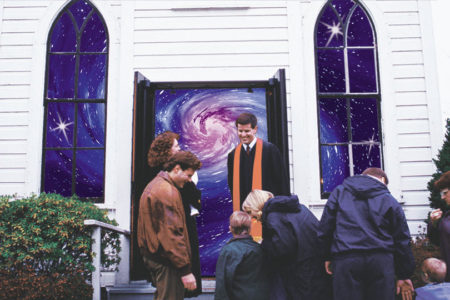America in the New Millennium
On the 31st of this month, at the stroke of midnight, the world will finally enter the much-awaited Year 2000. Will automatic teller cards still work? Will electricity still flow? Will America conduct business as usual, or will the Y2K computer bug cripple everyday life as we know it? Within days all these questions, which have preoccupied Americans for more than a year, will finally be answered. But so many more remain, and it appears that uncertainty concerning various aspects of the future will dog America’s steps into the next millennium.
For a country only 224 years old, America has led the way to the good life. People around the globe come here to use the hospitals and universities. Wall Street stands among the financial beacons of the world, and the mercurial rise of a certain computer software company in the Pacific Northwest has put America back on the technological map. On the surface, all is well, and prospects for the future look extremely promising.
Yet terrorism poses a tremendous threat to national security. Will America be subjected to a horrifying attack? If so, when? How susceptible is the U.S. to attack from biological and chemical weapons currently being developed by enemy nations?
India, Pakistan, North Korea, the Middle East, and other areas of the world are unstable. Will the new millennium bring an eruption of war in these regions?
What does the next millennium hold for America? A sixth-century Chinese poet, Lao Tzu, once said, “Those who have knowledge don’t predict. Those who predict don’t have knowledge.” Prognostication can be risky business. One can only speak authoritatively about the future where God has clearly spoken. God has done so on many subjects in the Bible, but the precise future of America is not one of them.
Yet the writer of 1 Chronicles, under inspiration of the Holy Spirit of God, commended the tribe of Issachar for being discerning concerning the trends of the day and deducing how then to live. They were men, the Bible says, “who had understanding of the times, to know what Israel ought to do” (1 Chr. 12:32). What is happening in America today, and what ought God’s people to do?
The Technological Times
It is astounding how much technology has progressed in the past two hundred years. The 1800s witnessed the harnessing of energy and the invention of many useful machines. James Watt’s work with the steam engine in 1764 laid the groundwork for the industrial revolution that changed the Western world. The first steam-driven vehicle, Robert Fulton’s paddle wheeler Claremont, opened the door to more efficient transportation in 1807. Rudolf Diesel’s patent of the diesel engine in 1892 constituted another step toward freedom of travel. Harnessing steam for energy changed the face of this nation, shifting it from a rural, agrarian economy to one that today employs less than 1 percent of its population on farms.
In 1837 Samuel Morse’s invention of the telegraph initiated a dramatic change in the effectiveness and speed of communication, and Thomas Edison’s invention of the incandescent electric light bulb in 1880 forever altered the living and working habits of most of the world.
But it was the 1900s that virtually exploded with technological advances. In 1903 the Wright Brothers tested their embryonic aircraft at Kitty Hawk, North Carolina, and a scant 74 years later, a supersonic transport routinely began flying passengers across the Atlantic Ocean from New York to London in a mere three hours and twenty minutes. Today, thanks to computers, we regularly send vehicles into outer space, travel throughout the world with ease and comfort, talk on cellular phones, use the Internet, and handily conduct business online with people on faraway continents.
In fact, technological advances are coming at an astounding rate. Computer speeds are said to be doubling and prices dropping every 18 months. Companies are racing to build worldwide satellite systems of communication; and the Internet, which originally opened the door to global communication for the man on the street, is continually expanding its use and its market.
Enhanced communication, though, can be both beneficial and detrimental. While the Internet certainly has merit, it also has become a prime vehicle for the spread of pornography, hatred, racism, and other godless practices and philosophies. Such easy access to evil has forced many Christians to restrict or refuse Internet access to their children.
On the other hand, the World Wide Web offers thousands of sites containing biblically based articles, church home pages, mission agency Web pages, and the like that provide much excellent information. Correspondence with overseas missionaries is inexpensive and virtually instantaneous. Some believers have successfully used the Web in evangelism, and innovative groups are buying advertising space and challenging readers to consider the claims of Jesus and to receive Him as Lord and Savior.
Technology, at least during the first part of the next century, will more greatly influence the area of communications than any other. The biblical teaching that “faith cometh by hearing, and hearing by the word of God” is basic to all believers who want to share the message of salvation. Because God has commanded His church to proclaim the gospel, Christians should take full advantage of this new communications tool.
The Cultural Times
American culture has become progressively decadent and immoral over the last thirty years. Although this decline in decency is evident, many deny the reality of it and are redefining basic moral values. Even liberal U.S. Senator Daniel Patrick Moynihan has commented on the growing “normalization” of deviancy. In the American Scholar, 1993 winter edition, Moynihan wrote an article entitled “Defining Deviancy Down.” He wrote, “The amount of deviant behavior in American society has increased beyond the levels the community can ‘afford to recognize’ and that, accordingly, we have been redefining deviancy so as to exempt much conduct previously stigmatized, and also quietly raising the ‘normal’ level in categories where behavior is now abnormal by any earlier standard.”
Moynihan’s article predated the growing acceptance of euthanasia, or so-called “mercy killing.” It also predated these more recent developments: the widening acceptance of homosexuality, the edicts of President Clinton authorizing homosexuals in the military, the recent decision by the courts requiring the Boy Scouts of America to accept homosexual leaders, and acceptance of the totally indefensible practice of killing fully formed babies in their mother’s womb via partial-birth abortion.
The music of young people is a window into their soul, and the view these days is not pretty. Sex, drugs, rebellion, and violence of the basest sort are such standard fare that the culture of the ‘60s, accused of having started the downward slide, pales in comparison.
The decade of the ‘90s has witnessed a marked increase in mass murders and is no stranger to seeing young people routinely kill their peers in depraved acts of madness. The recent Columbine High School shootings in Littleton, Colorado, is symptomatic of a society that has lost its moral underpinnings. Teen gangs roam the streets in many cities, and schools have had to install equipment to screen for weapons. But why should Americans expect less after rearing its youth on a godless, evolutionary, nonabsolutist view of morality and life?
The Bible explains how this moral disintegration occurs. It is nothing new to God. During this time period in which we live, generally referred to as the Church Age, the nations of the world are under the control of Satan. The Bible calls Satan the “prince of this world” (Jn. 12:31; 14:30; 16:11); his demons are called “the rulers of the darkness of this world” (Eph. 6:12); and the Scriptures reveal that Satan controls the kingdoms of this world and has authority to offer them to whomever he likes (Lk. 4:5–6).
The Scriptures also reveal that relatively few people, in proportion to the entire world population, will accept Jesus as personal Lord and Savior. Roman 11:5 says only a remnant of Jewish people will receive Jesus as their Messiah. At the first church council in Jerusalem, the Jewish disciples discussed how God “did visit the nations [Gentiles], to take out of them a people for his name” (Acts 15:14). The inference is that only a portion of the Gentiles will be saved in this age. This teaching corresponds to what Jesus Himself taught on this subject.
Jesus was teaching as He walked toward Jerusalem (Lk. 13:22–24). One follower asked Him, “Lord, are there few that be saved?” Jesus’ answer was straightforward: “Strive to enter in at the narrow gate; for many, I say unto you, will seek to enter in, and shall not be able.” Yes, only a few will be saved from the penalty due them for their sin. Many will be attracted to Jesus and to a proliferation of pseudo-Christian religions, but only a few will become genuinely saved through faith in Jesus as their sinbearer. The vast majority of people on earth will reject the forgiveness they can receive through Christ and will thus remain unsaved, unforgiven, and unregenerate.
Ultimately, it is this great majority of unregenerate people who cause a nation to self-destruct. Even if a country begins with a significant Christian presence, as was true of the United States, sooner or later the number of ungodly outweigh the godly. Without even realizing whom they are following, the unsaved will pursue Satan, their spiritual leader, down a path of corruption and immorality until the whole country becomes corrupt, immoral, and anti-Christian. This is exactly what is happening in the United States today and what has been happening throughout the world these last two thousand years. In Romans 1:21–32, God sketches the regressive direction a society travels. If present trends continue, what, then, lies ahead for our country and Bible-believing Christians? Immorality will increase. Laws favorable to an unbiblical lifestyle will increase. Laws hostile to Christianity will increase. Bible-believing Christians will face the possibility of becoming a smaller minority, and in all probability, will eventually become ostracized and persecuted for our beliefs.
What can and should we do to prepare for the future? Political change is not the only answer. Yes, Christians in America should use their influence to help change the system and work for the passage of righteous, moral laws. We must understand, however, that these efforts will ultimately be short-term successes at best. What the church should do is what God has specifically called it to do: to help change lives by proclaiming the Messiah—crucified and risen and able to save any who call upon His Name.
The United States as a nation is on a moral and cultural downward slide. We, as Christians, can make a difference if we make sure we are children of the King, walking in the light of His Word, and doing all we can to love people to life in Christ. If we do this, God will give us the grace to honor Him no matter how dark the days ahead become.






